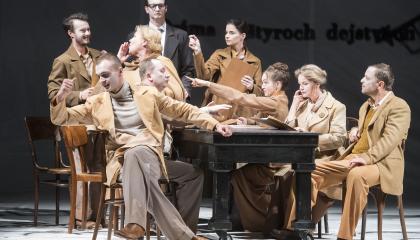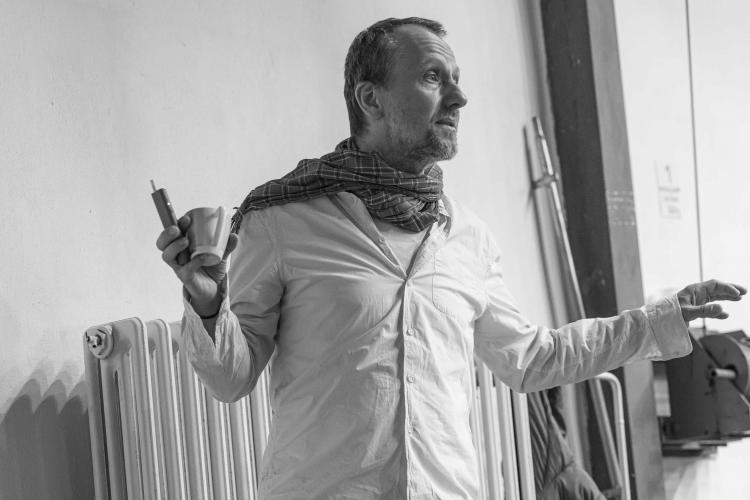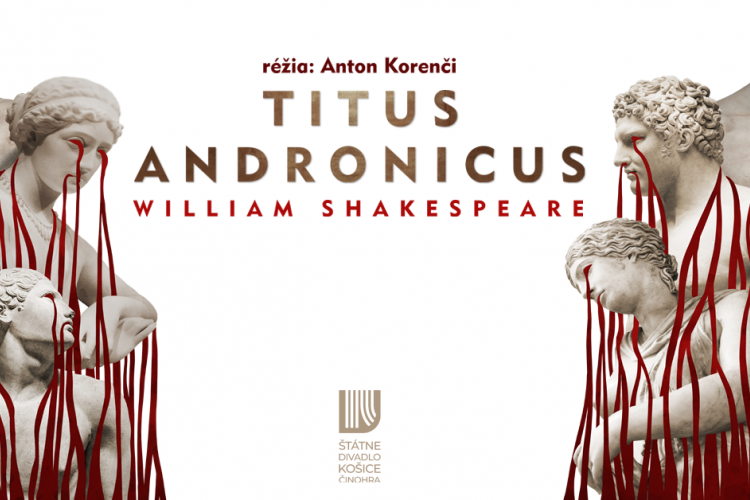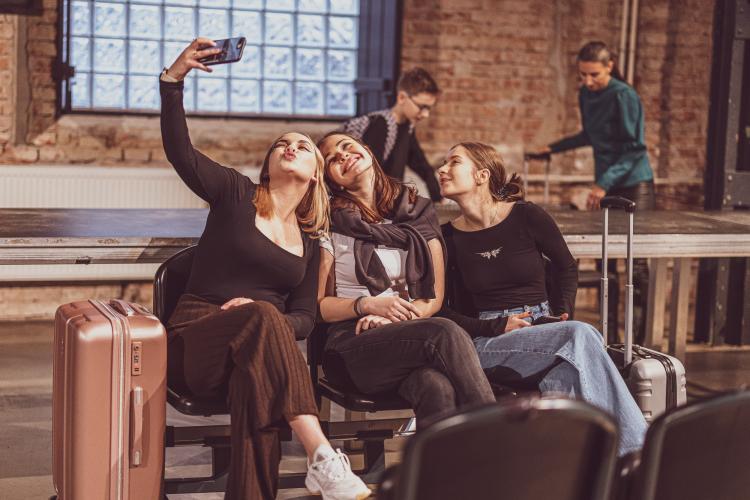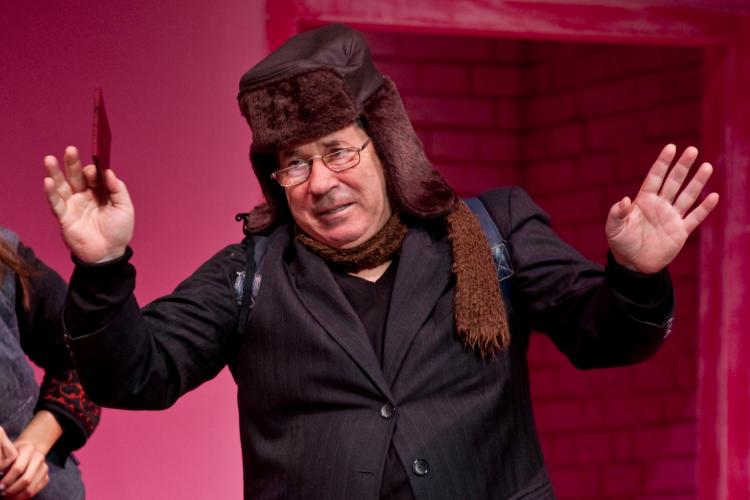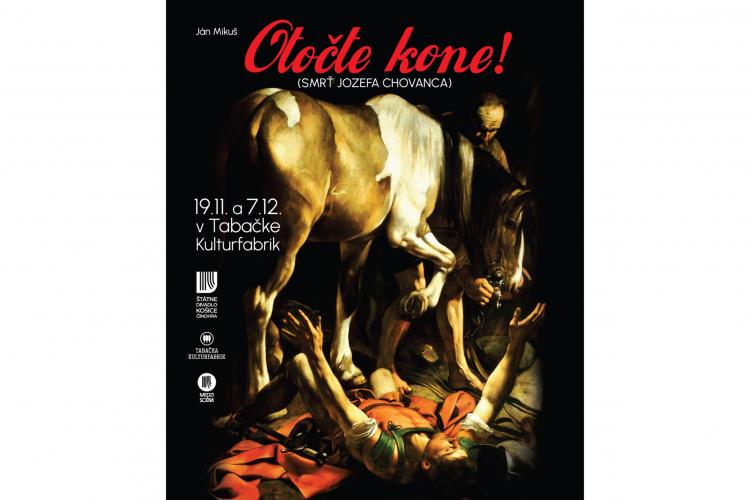In two weeks, on Friday, September 25, the unique drama production Borodáč or Tri sestry will have its world premiere in the Historical Building of the State Theater in Košice. The theater prepared it as its contribution to the celebrations of the 100th anniversary of the establishment of the Slovak professional theater, celebrations of which are taking place throughout the Year of the Slovak Theater 2020. The interesting fact about the whole project is that the text of the original Slovak play was written by three authors from three generations - Karol Horák, Michal Ditte and Michal Baláž. From a different point of view, each of the authors focused on the personality of Janko Borodáč, who 75 years ago, so to speak, built the East Slovak National Theater out of nowhere (since 1955 the State Theater in Košice).
For Karol Horák, Borodáč is the genesis of various topics. "It's a wonderful topic for me. As a teacher, I appreciate one thing and that is that the biography of Borodáč contains the genesis of a creative personality and, at the same time, the genesis of young Slovak intelligence, which did not exist before 1918. His demanding personality formation through social background, school, teaching, and then unreal patience, are unique not only in the Slovak theatrical context. His tough lighting work is invaluable. He felt that if the theater was to be national, it had to fulfill a function. He felt that theater could do more than literature. Borodáč lived through several social upheavals. However, he never joined any political party, but he always had to turn to the government, because the theater simply needed money, " the playwright, novelist, author of radio plays, television scripts, scientific publications, university teacher and theater performer says. When writing his part of the text, he also dealt with Borodáč's theatrical activities in connection with his work in Košice. "It is unbelievable what he did in Košice in a short time after the war. Seats cut, ruined, theater destroyed, even the caretaker did not want to let him in. And he revitalized. I can't even imagine that in the conditions he had here. And Košice at that time was not Slovak, it is known. It also takes a lot of physical strength - to rebuild a theater with three ensembles. He did it,” emphasizes Horák, who characterized Borodáč with these words - a fanatic of work.
"It was not possible to find out why they did not have a child with Oľga and how they dealt with this (certain trauma). From the point of view of what I read, it seems that they took Slovak theater into foster care, “thinks Michal Ditte, who watched Oľga and Janko Borodáč on their journey through the geographical points where they found themselves because of the theater. . "Prague. Bratislava. Vrútky for a while. Sabinov. Košice. But also Moscow and Borodáč’s three times plotted meeting with Stanislavský. For a long time I tried to get to know Janko Borodáč and Oľga. Get to know them as people. I have no idea if I succeeded (in establishing a relationship with them), but I found a few situations and sentences in their lives that were a source for processing, let's say, dramatic situations,” Ditte suggests the content of his contribution to the game. While studying the materials, he was also surprised by Borodáč's diligence. "I think Borodáč was an excellent organizer. I don't want to judge his directing talent, that's what theater historians are for. Personally, I was quite surprised by his hard work, tenacity and multiple managerial restarts. In terms of building the Slovak theater, he did a piece of honest organizational work,” Ditte adds.
According to Michal Baláž, Borodáč, in the terminology of Hollywood films, is a Slovak prototype of the "from zero to hero" phenomenon. "Such as Forrest Gump, Johnny Cash, Andy Warhol .... A man who has evolved from an ordinary boy from the poorest conditions and from the provincial part of the small town to the most important and prominent figure in his field in the country, the founding father, a respected expert, a recognized director and a man who worked his way up from the edge of the society into text books at schools. And even though historical circumstances and the necessary dose of happiness contributed to this to some extent, he still contributed to his "success" to a greater extent - with his diligence, stubbornness, zeal and determination. Almost to fanaticism. Yes, he was a fanatic. Perhaps that is why he still arouses such contradictory and opposing passions and opinions among theater actors and historians, “Baláž, who followed the level of Borodáč's privacy in his part of the text, explains . "Writing about a playwright is probably the same for a playwright as for a doctor to operate on a doctor ... or for a pastor to confess to another pastor. And actually not, it's completely different! Because Borodáč cannot read what I have written about him, it must be, in order for the analogy to be more precise, as follows: it is like for a pathologist to dissect another pathologist, for a pastor to bury a deceased pastor. But maybe it's like an attempt by a magician to practice a magic trick in front of a mirror and wait for his own reflection in the mirror to be deceived by that trick ... Anyway: the degree of fiction is something that I absolutely enjoy and be interested in, I adore mystifications, I love meta-humor and intertextuality. And if the playwright writes about the playwright, he can play with these layers and I played with them in my part of the text," Baláž explains his view of writing a text that he contributed to the play Borodáč or Three Sisters.
Karol Horák
Playwright, novelist, author of radio plays, television scripts, scientific publications, university teacher, theater performer. After graduating from the Eleven-Year High School in Banská Štiavnica (1960), he studied at the Faculty of Arts of the University of P. J. Šafárik in Presov (1960 - 1965). In the early 1960s, as a student, he founded the Student Theater with the Faculty of Arts of the University of P. J. Šafárik, in which he worked as an actor, playwright and director. The theater has developed into a leading alternative ensemble and has represented Slovakia at many foreign festivals (France, Austria, Yugoslavia, Poland, Spain). From 1965, he worked as a teacher at the Faculty of Arts of the University of Prešov. He became the head of the Department of Aesthetics and Art Sciences, later the Department of Cultural Studies. He has educated generations of students who are active in the literary, theatrical radio and television worlds. He was awarded the degree of professor in 1999. In the early 1970s, he briefly worked as an external playwright at the J. Záborský Theater in Prešov. In the years 1998 - 2003, he worked as the head of the literary-dramatic editorial board of Slovak Television. Founder and long-term director of the Academic Prešov festival. His dramatic texts The Battle of Rozhanovce, The Interwar Man, The Gospel of Jonáš (Záborský), The Destruction of Football in the City of K., Heaven, Hell, Kocúrkovo, "... Come Your Kingdom ...", La Musica, The Testimony of Blood, The Prophet Štúr and His Shadows and others staged at the Theater of the Slovak National Uprising in Martin, at the Slovak National Theater in Bratislava, at Andrej Duchnovič Theater and Jonáš Záborský Theater in Prešov and at State Theater in Košice.
Michal Ditte
Playwright, playwright and project manager. Graduate of the Academy of Performing Arts in Bratislava in the field of theater dramaturgy. In 2000, he co-founded the independent Pôtoň Theater, in which he has been holding the position of playwright since 2003. After 2006, he also worked as an editor of the Javisko magazine and as a project manager of the Scénická žatva festival in Martin. He worked externally with several cultural organizations as a lecturer of educational activities, especially in the field of creative writing and cultural management. Since 2011, he has been the director of the Pôtoň Theater and the chairman of the network of independent culture in Slovakia - Anténa. In 2013, he became a member of the editorial board of the magazines Javisko and Kultúrny kyslík!. Michal Ditte is the author of several plays, which were performed, in addition to his home theater Pôtoň, at the Slovak Chamber Theater, the Slovak National Theater, the Puppet Theater in Žilina and the Puppet Theater at the Crossroads (all directed by Iveta Ditte Jurčová). In addition to theatrical work, he also works for radio and television.
Michal Baláž
He is an author, poet, screenwriter and director. In 2010 he graduated from the Screenwriting Studio and in 2010 from film and television directing at the Academy of Performing Arts. He completed his doctoral studies in study program directing at the Academy of Performing Arts in 2016. During his studies, he completed a study stay at Volda University College in Norway, and was part of the East-West Talent Lab as part of the goEast Film Festival in Wisbaden. His filmography includes Journey to the Impossible (RTVS / ČT), Tru Štúr (RTVS), Hellkitt. While still a student, he made films and screenplays for the authors and directors Character in Black, Bastard, Amber Road, Second Attempt, Monster and Raven. As a playwright he collaborated on the productions Terror (Jonáš Záborský Theater in Prešov), School of Women (State Theater in Košice), Home (Andrej Duchnovič Theater in Prešov), tRip (Slovak National Theater in Bratislava), Hooray Luxus or the 90s (Aréna Theater), Woman Overboard, Barbados, 5 Boys and Identikit (Studio 12 Bratislava). He is also the author of the play Nemá trieda for Ján Palárik Theater in Trnava. He has collaborated on the series Horná Dolná, Oteckovia, Ministri, Kukátko, Autoškola, Zita na krku and others. He has won several awards such as the Milan Rúfus Award for Poetry, the Ivan Krasko Award for Debut, the Tatrabanka Foundation Award for Young Filmmakers in the Film and TV category, the Ján Fajnor Award for Filmmakers under 35, and True Štúr, he won the Student Jury Prize at the Finals Festival in Pilsen. He became the Winner of the Rudolf Fábry Award. He won a creative award in Poviedka 2014, 2nd place in the Drama 2012 competition and the Kodak Vision Award at the International Student Festival in Písek, the Audience Award at the International Student Festival in Bali for the film Raven and the main Tunnel award in the feature film competition.

